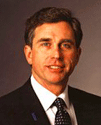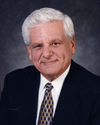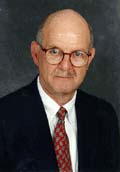
| Forecasts | CA Model Data | Contact Us | Profile | Login |
 Russell Goldsmith Russell GoldsmithChairman and Chief Executive Officer City National Bank |
|
As chairman and chief executive officer of City National Bank, Russell Goldsmith leads a financial institution of $12.4 billion in total assets. Additionally, he serves as vice chairman and chief executive officer of City National Corporation. He has been a director of both the bank and its parent company since 1978.
Since Mr. Goldsmith became CEO in October 1995, City National’s assets and earnings have more than tripled. During this period, the company has made 11 acquisitions and established a presence in the San Francisco Bay Area. It is now the second largest independent bank headquartered in California. Last year, in its annual survey of CEO pay and performance, Forbes magazine ranked Mr. Goldsmith among the 10 best chief executive officers in America. From 1986 until its sale in 1994, Mr. Goldsmith was chairman of the board and chief executive officer of publicly held Republic Pictures Corporation, a leading global independent entertainment production and distribution company. He also was vice chairman of the San Diego Padres Baseball Club from 1990 to 1994. He previously served as chief operating officer and a director of Lorimar, Inc., a public entertainment company, from 1983 through 1985. Mr. Goldsmith began his professional career as an attorney, practicing at Irell & Manella. He later founded his own firm, Sanders, Barnet & Goldsmith, where he specialized in entertainment law. He is a graduate of Harvard College and Harvard Law School. Mr. Goldsmith is active in civic affairs. He is a member of both the Los Angeles Branch Board of the Federal Reserve Bank of San Francisco and the Los Angeles Business Advisors. In addition, he serves on the board of governors for The RAND Graduate School and on the board of trustees for the Harvard-Westlake School. He also serves on the boards of directors of The Financial Services Roundtable, the United Way of Greater Los Angeles and the Bay Area Council. |
| CLOSE WINDOW |
 Bruce Willison Bruce WillisonDean, The Anderson School at UCLA John E. Anderson Chair in Management |
|
Bruce G. Willison is the seventh dean of The Anderson School at UCLA, where he is the John E. Anderson Chair in Management. His appointment in 1999 came after a distinguished 26-year career in the banking industry, in which he most recently served as the president and chief operating officer of Home Savings of America and H.F. Ahmanson & Co.
Mr. Willison began his banking career at Bank of America, where he held several corporate and lending positions in Los Angeles and Mexico City. He joined First Interstate Bancorp in 1979 as a strategic planner and held various executive positions at the bank and its holding company. Among the positions he held were chairman and chief executive officer of First Interstate's Oregon operation, and chairman, president, and chief executive officer of First Interstate Bank of California, as well as vice chairman of the bank’s holding company, First Interstate Bancorp, a position he held until 1996. Then, Willison became the president and chief operating officer of H.F. Ahmanson and Co., the parent of Home Savings of America, one of the largest savings banks in the country. Though his appointment as dean marked his first academic post, Mr. Willison has had a long association with The Anderson School, serving on its Board of Visitors since 1993. He also serves as a director of Health Net, Inc., SunAmerica, Inc.’s fund complex and Homestore, Inc. Mr. Willison and his wife Gretchen are active members of the Los Angeles community, providing energy and enthusiasm to a host of organizations. Mr. Willison serves on the boards of the United Way of Greater Los Angeles, the Los Angeles Sports Council and Operation Hope, Inc. A native of Riverside, California, Mr. Willison earned a bachelor’s degree in economics from UCLA, and an MBA in finance from the University of Southern California, following his service as an officer in the U.S. Navy. |
| CLOSE WINDOW |
 George David Kieffer George David KiefferGovernment and Policy Partner Manatt, Phelps & Phillips, LLP |
|
Mr. Kieffer is a member of the Firm’s Executive and Management Committees and co-chairs the Firm’s Government Division, one of three firm divisions. He has a broad breadth of general business and regulatory practice experience and oversees major business litigation, business transactions and land use matters. He is often engaged to address major strategic issues in business and public policy. In addition to his basic business law background, Mr. Kieffer has particular expertise in municipal and administrative law.
Mr. Kieffer’s clients include, among others, CEMEX, Inc., the City of Los Angeles Department of Water and Power, Goldman, Sachs & Co., ACS State and Local Solutions, Kajima Engineering and Construction, Inc., the Los Angeles County Museum of Art, Los Angeles Orthopaedic Hospital, Sealed Air Corporation, Toyota Motor Sales, U.S.A., Inc., SBC California, Verizon Communications, and Verizon Wireless. Mr. Kieffer has been called upon to undertake various civic assignments, including successfully chairing the commission charged with re-writing the Los Angeles City Charter. The new City Charter, the first full revision in 75 years, was adopted in 1999. Mr. Kieffer is currently Chair of the Board of Directors of the Los Angeles Area Chamber of Commerce. |
| CLOSE WINDOW |
 Albert Carnesale Albert CarnesaleChancellor of UCLA |
|
Albert Carnesale became Chancellor of the University of California, Los Angeles (UCLA) on July 1, 1997. As chief executive officer, he leads an institution comprising more than 37,000 students and 25,000 faculty and staff; is responsible for all aspects of the University’s mission of education, research, and service; manages an enterprise with an annual budget of almost $3 billion; and serves as principal spokesman for the university community.
An active teacher and lecturer, Chancellor Carnesale holds professorial appointments in the School of Public Policy and Social Research and in the Henry Samueli School of Engineering and Applied Science. He teaches an undergraduate course in international affairs and security, and is a sought-after speaker on that topic, as well as on higher education. He is the author or co-author of six books and more than 50 scholarly articles on a wide range of subjects, including the control of nuclear weapons and other weapons of mass destruction, international energy issues, the effects of technological change on foreign and defense policy, and challenges and opportunities facing higher education. Under Chancellor Carnesale’s leadership, UCLA has continued to garner recognition and accolades for excellence across the full span of its enterprise. The Chancellor strongly supports the crossing of academic boundaries, an area in which UCLA has a distinct comparative advantage, given its broad range of disciplines on a single campus. Among the interdisciplinary endeavors launched during the past six years are the California NanoSystems Institute, a joint endeavor with UC Santa Barbara that was established as one of Governor Gray Davis’ California Institutes for Science and Innovation; the “Genetics and Society” initiative, which gave rise to the Center for Society, the Individual, and Genetics; and “UCLA in LA,” an umbrella program designed to strengthen and expand the University’s extensive engagement with the broader community. UCLA’s research program has thrived during Chancellor Carnesale’s tenure. In 2001-02, UCLA received $768 million in competitively-awarded, extramural contracts and grants – a campus record and a 15-percent increase over the previous year. In the category of federal funding for science and engineering research, UCLA climbed the national rankings from twelfth in 1997 to third in 2000. Chancellor Carnesale also has guided UCLA to unprecedented achievement in the realm of private fund-raising. He has presided over the entire public phase of Campaign UCLA, the University’s landmark development effort. Having reached each of its milestones ahead of schedule, the Campaign is presently nearing its overall goal of $2.4 billion – double the original goal that was announced shortly before Mr. Carnesale’s appointment. In fiscal year 2001-02, UCLA received a record total of $509.4 million in private gifts and pledges, including David Geffen’s gift of $200 million for the School of Medicine. Prior to assuming the chancellorship of UCLA in 1997, Mr. Carnesale was at Harvard University for 23 years, serving as Provost of the University from 1994 to 1997. He held the Lucius N. Littauer Professorship of Public Policy and Administration at Harvard’s John F. Kennedy School of Government, where he served as Academic Dean (1981-91), and Dean (1991-95). His earlier career included positions in the private sector and in government. Mr. Carnesale has represented the United States Government in high-level negotiations on defense and energy issues (including the Strategic Arms Limitation Talks, SALT I, with the Soviet Union), and has consulted regularly for several government agencies and companies. He holds bachelor’s and master’s degrees in mechanical engineering and a Ph.D. in nuclear engineering, has been awarded three honorary doctorate degrees, and is a fellow of the American Academy of Arts and Sciences and a member of the Council on Foreign Relations. Mr. Carnesale and his wife, Robin, live in the Chancellor’s Residence on the UCLA campus. |
| CLOSE WINDOW |
 Edward E. Leamer Edward E. LeamerDirector UCLA Anderson Forecast |
| Edward Leamer is the Chauncey J. Medberry Professor of Management, Professor of Economics and Professor of Statistics at UCLA. He received a B.A. degree in mathematics from Princeton University and a Ph.D. degree in economics and an M.A. degree in mathematics from the University of Michigan. After serving as Assistant and Associate Professor at Harvard University he joined the University of California at Los Angeles in 1975 as Professor of Economics and served as Chair from 1983 to 1987. In 1990 he moved to the Anderson Graduate School of Management and was appointed to the Chauncey J. Medberry Chair. Professor Leamer is a Fellow of the American Academy of Arts and Sciences, and a Fellow of the Econometric Society. He is a Research Associate of the National Bureau of Economic Research and a visiting scholar at the International Monetary Fund and the Board of Governors of the Federal Reserve System. Dr. Leamer has published over 100 articles and 4 books . This research has been supported by continuous grants for over 25 years from the National Science Foundation, the Sloan Foundation and the Russell Sage Foundation. His research papers in econometrics have been collected in Sturdy Econometrics, published in the Edward Elgar Series of Economists of the 20th Century. His research in international economics and econometric methodology has been discussed in a chapter written by Herman Leonard and Keith Maskus in New Horizons in Economic Thought: Appraisals of Leading Economists. Recent research interests of Professor Leamer include the North American Free Trade Agreement, the dismantling of the Swedish welfare state, the economic integration of Eastern Europe, Taiwan and the Mainland, and the impact of globalization on the U.S. economy. |
| CLOSE WINDOW |
 Tom Lieser Tom LieserSenior Economist UCLA Anderson Forecast |
| Tom Lieser joined The UCLA Anderson Forecast in 1993, and assumed his current position as senior economist this past year. He has significant input into the national forecast, authors the quarterly UCLA Anderson Forecast for California, and has written a number of studies focusing on business trends in California's principal regions and industries. Previously, Dr. Lieser was vice president and senior economist with Security Pacific Bank (now Bank of America). He earned his Ph.D. in business economics from The Anderson School at UCLA (in 1977), an M.A. in economics from the University of Wisconsin and an A.B. in economics from Stanford University. |
| CLOSE WINDOW |
 Christopher Thornberg Christopher ThornbergSenior Economist UCLA Anderson Forecast |
|
Christopher Thornberg is a Senior Economist with the UCLA Anderson Forecast. Dr. Thornberg authors the Anderson Forecast for Los Angeles and East Bay regions. He has also been involved in a number of special studies measuring the impact of important events on the economy, including the NAFTA agreement, the recent California power crisis, and the September 11 terrorist attacks.
He received his Ph.D in Business Economics from The Anderson School (1996) and specializes in International and Labor Economics as well as Industrial Organization. Dr. Thornberg previously held a faculty position in the economics department at Clemson University. |
| CLOSE WINDOW |
 Michael Bazdarich Michael BazdarichDirector UCR Forecasting Center |
|
Michael Bazdarich is a native Californian who studied Economics at the Universities of Santa Clara and Chicago, receiving a B.A. from Santa Clara in 1971 and a Ph. D. in Economics from University of Chicago in 1978.
He has run his own consulting firm, MB Economics, since early 1986, providing financial market forecasting and advisory services to major financial institutions, investment managers, and industrial corporations. He also has performed extensive expert testimony work in various civil litigations. A major product of MB Economics is its Weekly Report, which presents analyses and forecasts based on current developments in the economy and the financial markets. Since late-1986, Mr. Bazdarich, through MB Economics, has served as consulting economist to Union Bank, working closely with various areas of bank management and speaking to a wide range of client groups. Other clients include the Western Asset Management, North American Title Company, Kemper Finanacial Services, the Prudential Insurance Company, and others. Beginning in 1993, Mr. Bazdarich has also worked as Director of the UCR Forecasting Center in the Graduate School of Management of U.C. Riverside. The Center provides a resource for public agencies and private companies in the Riverside-San Bernardino area, tracking and forecasting the economy of that rapidly growing area of Southern California. Prior to forming his own consulting firm, Mr. Bazdarich worked with the Federal Reserve Bank of San Francisco, United California Bank (now First Interstate Bank of California), and Claremont Economics Institute. His first position after graduate school was as an Economist in the Research Department of the Federal Reserve Bank of San Francisco, from 1977 to 1980. There, he specialized in analysis of exchange rate policy and of inflation. He also performed Federal Open Market Committee policy advisory work for the bank in the areas of Federal Funds Rate targetting and exchange market intervention. In 1980, he was appointed Vice President, Deputy Director of Research, at United California Bank. Responsibilities included management of the bank's research staff and its interface with bank operating divisions. In 1981, he joined Claremont Economics Institute, first as Senior Economist, later becoming Vice President, Forecasting/Advisory Services. He wrote the Institute's weekly Money Market Letter and its Domestic Forecast Book, managed its forecasting operations, and supervised client services. Clients included industrial corporations and investment management operations, such as General Electric, TIA/CREF, Dillon Read Capital, and Citibank, as well as California real estate market participants such as Home Savings, Glendale Federal Savings, the Irvine Company, and the Koll Company. He contributes interviews and articles regularly to national and local television, radio, and print media, and he is an active public speaker. He is married, with two children. |
| CLOSE WINDOW |